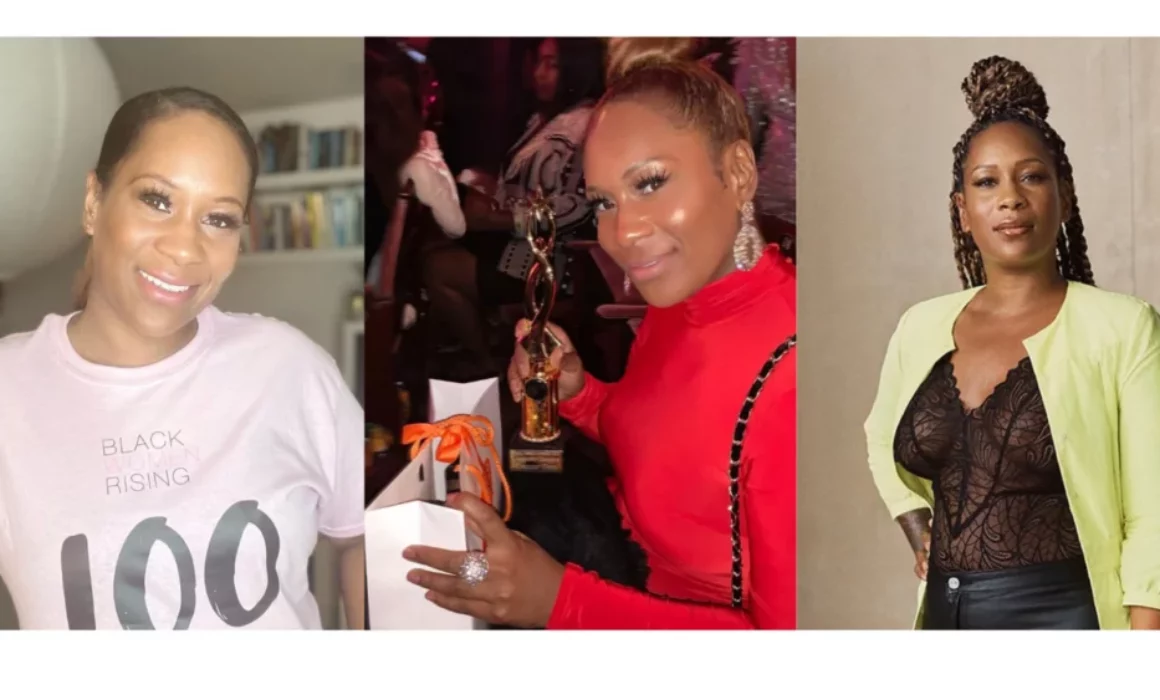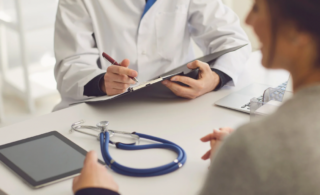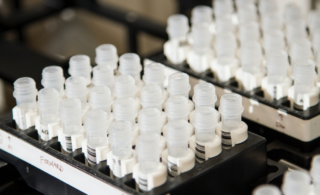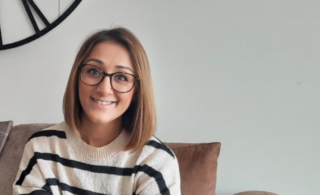
Let's Nail Breast Cancer - Help support our urgent appeal on the 19th - 20th May 2024
Let's Nail Breast Cancer - Help support our urgent appeal on the 19th - 20th May 2024
Let's Nail Breast Cancer - Help support our urgent appeal on the 19th - 20th May 2024
Let's Nail Breast Cancer - Help support our urgent appeal on the 19th - 20th May 2024
Let's Nail Breast Cancer - Help support our urgent appeal on the 19th - 20th May 2024
This article is a Q&A with Leanne Pero, the founder of Black Women Rising who set up the community group following her diagnosis of breast cancer.
Leanne was diagnosed with breast cancer in 2016 and has subsequently spent a large proportion of her time involved in breast cancer awareness campaigns and helping others who are going through breast cancer. You’ll probably have come across Leanne via one of her brilliant cancer projects – whether Black Women Rising (including the brilliant magazine), the Positive Day Planner, – or one of her interviews. Leanne was deservedly nominated and subsequently in the final of the Lorraine Woman of the Year for 2019 and she has won a number of awards for both her breast cancer work and other community/dance work. I want you to get to know the person behind these accolades and understand what is was that led her to focus a lot of her time in helping others facing breast cancer…
CAN YOU START BY TELLING US A BIT ABOUT YOUR DIAGNOSIS?
After finding a lump in my right breast, I was diagnosed with Stage 3 Breast Cancer, aged 30 in October 2016, just 6 months after my mum was diagnosed with breast cancer for the second time. I underwent 8 gruelling rounds of chemotherapy, a bilateral mastectomy and immediate reconstructive surgery.
YOU WERE YOUNG WHEN YOU WERE DIAGNOSED WITH BREAST CANCER, HOW DID THE DIAGNOSIS IMPACT YOUR LIFE AT THAT YOUNG AGE?
I had convinced myself it was nothing so when I heard the words “I am not going to beat around the bush, we’ve found cancer” I went into a state of panic and anxiety. I couldn’t shake the sense of shame around my diagnosis so only very close family and friends knew but no matter how many wonderful people you have around you, cancer is a lonely journey.
YOU WERE RUNNING YOUR OWN BUSINESS WHEN DIAGNOSED, HOW DID YOU JUGGLE EVERYTHING DURING YOUR TREATMENT? WERE YOU ABLE TO CARRY ON WORKING DURING TREATMENT, OR DID YOU TAKE SOME TIME OFF WORK?
At the time of my diagnosis I was fit and healthy, I was a successful business owner and I had a dream job at the world-renowned Pineapple dance studios. I was also at university finally getting my business management degree. Due to the intense nature of my treatment and subsequent surgery I was not able to carry on working. I had a few days to hand over the business, defer uni and cancel all commitments.
BEING DIAGNOSED WITH BREAST CANCER AS A YOUNG BLACK WOMAN HAD A HUGE IMPACT ON YOUR LIFE – CAN YOU TELL US A BIT ABOUT THIS?
A week after my diagnosis, during an appointment with my oncologist, I was told that many people within the BAME community refuse the drugs. She told me “I know you will beat this, and I am going to need you to go out and educate everyone that chemo is not that bad so that they stop refusing the drugs”. Whilst I appreciated her vote of confidence, at the time I forgot her plea. Little did I know that the future would see me setting up a charity to help others in the same situation as me.
Lots of people find that cancer impacts their mental health. You’ve been vocal about the impact of cancer on your mental health – can you tell us a little bit about how it affected you and what you did to deal with this?
I definitely struggled with my mental health both during treatment and after it. Everything in your life changes in an instant. Your body changes. You lose so much both physically and mentally.
I began to see a therapist which has helped me immensely. In addition to that I starting a gratitude journal. I found this incredibly useful. Even on the days I had chemo, I made sure to write down things I was grateful for. It was such an important tool for me that last year I launched a new company called The Positive Day Planner and created 21-day gratitude planners.
I’VE BEEN FOLLOWING YOUR FANTASTIC BLACK WOMEN RISING CAMPAIGN SINCE IT’S LAUNCH. CAN YOU TELL US A BIT ABOUT THE CAMPAIGN?
Black Women Rising started as monthly peer to peer support groups – these are the heart of the project. From there we ran pamper events for women of colour. The next big step was the UK first’s all-Black cancer portrait exhibition which launched at The Oxo Tower and then toured London. In 2020 we launched our weekly podcast as well as publishing our inaugural magazine.
WHAT LED YOU TO SET UP BLACK WOMEN RISING?
In my quest to find the right services to help me, I realised that the NHS lacked cancer support packages for Black and BAME cancer patients. From there I saw that stories from my community were being excluded from the UK’s mainstream media outlets, magazines and perhaps most importantly – from reputable annual cancer campaigns by brands and charities failing miserably at diversifying their campaigns. All this did was further fuel the false narrative that cancer is “not a black disease”.
I began meeting women and men who were either mis-diagnosed, not offered mental health support and generally left feeling excluded from communication with their consultants which echoed the man other health inequalities in the BAME community.
YOU’VE BEEN VERY ACTIVE IN THE CANCER COMMUNITY RAISING AWARENESS OF BREAST CANCER ISSUES OVER AND ABOVE YOUR BLACK WOMEN RISING CAMPAIGN, WHAT SORTS OF THINGS HAVE YOU BEEN INVOLVED IN?
I am always ready to get involved with other charity campaigns as well as those of major brands. Some of these include Pretty Little Thing, Stella McCartney, Estee Lauder, GHD, Zalando, Breast Cancer Now, CoppaFeel!, Future Dreams.
WHAT WOULD YOU SAY ARE THE KEY MESSAGES THAT YOU’D LIKE TO PASS ONTO YOUNG WOMEN (OR ANY RACE, NATIONALITY, SEXUALITY) WHO ARE DIAGNOSED WITH CANCER?
My biggest message is to take every day as it comes.
And the other is to seek external support. Find organisations like ours where you can meet likeminded women to help you through everything.
To find out more about Leanne and Black Women Rising, you can follow them on:
Instagram: Leanne Pero and Black Women Rising
Twitter: Leanne Pero
Facebook: Leanne Pero
And you can order a free copy of the magazine here.
To return to the homepage of our Information Hub, click here where you can access more helpful information, practical advice, personal stories and more.
Future Dreams hold a range of support groups, classes, workshops and events to help you and your carers during your breast cancer diagnosis. These are held both online and in person at the London-based Future Dreams House. To see what’s on offer and to book your place, see here.
February 2021 (Reviewed February 2024)
This article was written by a guest author based on their own experience of breast cancer and its treatment. It is important to note that this is one person’s experience and that whilst there may be commonalities between the experiences of different people, everyone has a different diagnosis/treatment plan/general experience. The information and content provided in all guest articles is intended for information and educational purposes only and is not intended to substitute for professional medical advice. It is important that all personalised care decisions should be made by your medical team. Please contact your medical team for advice on anything covered in this article and/or in relation to your personal situation. Please note that unless otherwise stated, Future Dreams has no affiliation to the guest author of this article and he/she/they have not been paid to write this article. There may be alternative options/products/information available which we encourage you to research when making decisions about treatment and support.
Share

Support awareness research
Donate to those touched by BREAST cancer
Sylvie and Danielle began Future Dreams with just £100 in 2008. They believed nobody should face breast cancer alone. Their legacy lives on in Future Dreams House. We couldn’t continue to fund support services for those touched by breast cancer, raise awareness of breast cancer and promote early diagnosis and advance research into secondary breast cancer without your help. Please consider partnering with us or making a donation.



